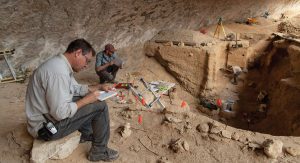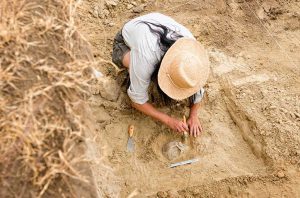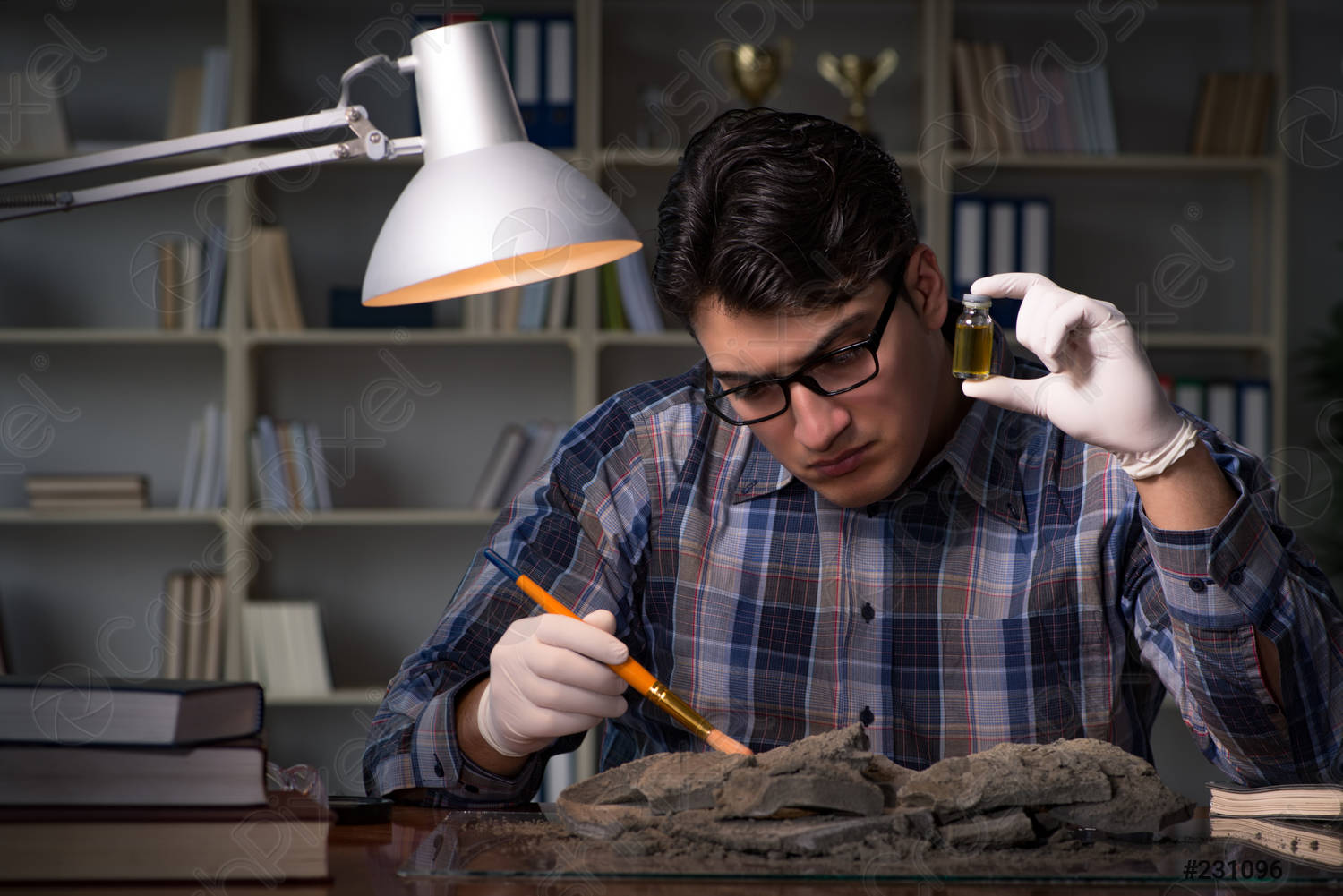To become an archaeologist is a valuable career where scientists discover, investigate, and interpret the physical remains of past human societies.

Become an archaeologist plays an important role in understanding the literature of human history and cultural evolution, which constitutes our valuable knowledge of past civilisations.
What are the Main Types of Archaeologists?
Archaeologists specialise in different areas: field archaeologists conduct excavations, laboratory archaeologists analyse artefacts, environmental archaeologists study past climates, and CRM archaeologists manage heritage sites.
Field Archaeologists
Field archaeologists excavate and document artefacts and structures at archaeological sites to uncover historical evidence.
Role and Key Responsibilities:
Field archaeologists conduct surveys and excavations at archaeological sites, identifying and recording the locations of artifacts, structures, and features. They are responsible for the excavation and documentation of these findings.
Laboratory Archaeologists
Laboratory archaeologists analyse artefacts and ecofacts using non-destructive techniques to interpret ancient materials and environments.
Role and Key Responsibilities:
Laboratory archaeologists analyse artefacts and ecofacts in a controlled laboratory setting. They use imaging and non-destructive analytical techniques to examine materials such as pottery, faunal remains, and plant remains, aiming to understand ancient environments, habitats, practices, agriculture, medicinal uses, and food preparation.
Environmental Archaeologists
Environmental archaeologists study past human-environment interactions through soil, pollen, and other data to reconstruct ancient landscapes and climates.
Role and Key Responsibilities:
Environmental archaeologists explore the relationships between past human populations and their environments. They use soil samples, pollen, and other environmental data to reconstruct historical landscapes and climates.
Cultural Resource Management (CRM) Archaeologists
Cultural Resource Management Archaeologists assess, protect, and manage archaeological sites to ensure they are preserved during development and construction projects.
Role and Key Responsibilities:
CRM archaeologists assess and manage archaeological sites, ensuring their protection and preservation according to legal and regulatory frameworks. They work to mitigate the impact of development activities, such as road-building, on important archaeological resources.
What does an Archaeologist do?

Archaeologists conduct field surveys and excavations, analyse artefacts, interpret findings, and collaborate with experts to uncover and understand past human societies.
Conducting Field Surveys and Excavations
To become an archaeologist, you conduct field surveys to locate potential sites and perform excavations to uncover artefacts and structures. This involves site mapping, digging, and contextualising findings.
Analysing Artefacts and Ecofacts in Laboratories
To become an archaeologist, you study artefacts and ecofacts in the lab to determine their origins, uses, and symbolic meanings. This process is time-consuming and involves various technologies, such as radiocarbon dating and microscopic analysis.
Interpreting Findings and Creating Reports
Based on their findings, archaeologists theorise about past human behaviour and social structures. They then compile detailed reports that contribute to scholarly knowledge and influence public understanding.
Preserving and Managing Archaeological Sites
To become an archaeologist, you prepare reports for ratification and approval, outlining the interpretive context and recommending site names and possible titles. Although they can conduct ceremonies and hope for success, they do not manage the process. They prepare detailed reports, including drawings, which are used for naming and approval, and establish conservation plans and site management strategies. The process involves granting different entities a ‘voice’ through the archaeologists’ work, rather than merely honouring researchers’ opinions.
Collaborating with Historians, Researchers, and Institutions
To become an archaeologist, you rely on historians, researchers, and institutions to disseminate their findings and build a fuller picture of past societies. This process helps extend their research and places their interpretations within a scholarly context
Average Salary Range of an Archaeologist
The average salary for archaeologists varies widely based on experience, location, and employment type, with senior and specialised roles earning more.
Salary Ranges Based on Experience and Location
Pay for archaeologists can vary significantly depending on experience, location, and other factors. Graduate archaeologists in the UK can expect an annual salary of approximately £20,000–£30,000. As they gain experience and move into mid-level roles, salaries typically rise to about £30,000–£45,000. Senior archaeologists and those in specialised roles can earn between £45,000 and £70,000 or more per year.
In the US, entry-level archaeologists generally earn between $40,000 and $60,000 annually. Mid-level archaeologists with several years of experience can expect to earn between $60,000 and $80,000 per year. Senior archaeologists working in large institutions or on high-profile projects may earn $80,000 to $100,000 or more.
Comparison of Salaries in Different Regions
Salaries for archaeologists can vary considerably by region. In the UK, for example, archaeologists working in London and other major cities often receive higher salaries due to the higher cost of living and greater demand for skilled workers. For instance, a London-based archaeologist might earn an additional £5,000–£10,000 per year.
Similarly, in the US, archaeologists in high-cost-of-living states like California, New York, or Texas tend to earn more compared to those in lower-cost states like Florida or Ohio. To become an archaeologist in New York City or San Francisco might earn two to three times as much as one in Wichita Falls, Texas, or Miami, Florida, due to the concentration of research institutions and competition for positions in these major hubs.
Factors that Influencing Archaeologist Salaries
Several factors can influence the salaries of archaeologists:
- Experience: To become an archaeologist with more experience generally command higher salaries compared to those who are less experienced. At the initial stage, after graduation, archaeologists typically earn a lower income. However, their salary tends to increase gradually as their experience grows.
- Higher Education: As with many professions, obtaining advanced degrees in archaeology is often associated with higher salaries. Specialised certifications and degrees can also lead to lucrative opportunities. For example, marine archaeology, which involves surveying shipwrecks and offshore sites, can command high salaries due to the specialised skills required and the relative scarcity of experts in this field.
- Location: Archaeologists working in urban areas or regions with a higher cost of living usually receive higher salaries compared to those in rural areas.
- Type of Employment: The type of employment can also affect salary. Archaeologists employed by local, state, or federal government agencies, large museums, or prestigious universities often earn more than those working for smaller institutions.
- Demand for Archaeologists: In areas where there is a high demand for archaeologists, salaries are often higher to attract and retain skilled professionals. Regional economic growth, industry trends, and market conditions all play a role in influencing demand.
Essential Skills of an Archaeologist

To become a successful Archaeologist, you need to bring together technical and soft skills.
Technical Skills
- Proficiency with Excavation Techniques and Tools: To become an archaeologist, you should be adept in using standard excavation techniques and tools for the recovery of artefacts and features. This includes techniques such as stratigraphy, soil sampling, and artefact extraction.
- Knowledge of Archaeological Theory and Methods: A solid foundation in archaeological theory and methods is essential. To become an archaeologist, you need to design effective research questions, excavate with skill, differentiate between various classes of artefacts, and accurately date them.
Soft Skills
- Analytical Thinking: To become an archaeologist, you must analyse data critically and draw inferences about prehistoric peoples and societies. They need to logically dissect problems and devise solutions.
- Attention to Detail: Archaeology requires remarkable attention to detail. In the field, archaeologists must identify and interpret subtle features that others might overlook. This involves recognising the difference between a partially exposed artefact and a mundane object, paying close attention to details, analysing samples, and meticulously recording findings. Accurate observations must be translated into evidence for interpretations and communicated with utmost clarity.
- Communication: Effective communication skills are crucial for presenting findings to the public and explaining them to fellow researchers. To become an archaeologist, you must be able to convey complex data clearly and understandably.
- Teamwork: To become an archaeologist, you often work in teams, both in the field and in the laboratory. Strong teamwork skills are necessary for coordinating efforts, organising responsibilities, and achieving research goals.
Career Development Tips for Archaeologists
- Keep Up with Relevant Archaeological Research and Discoveries: Archaeology is a multifaceted and evolving field, so staying up-to-date with recent discoveries and contemporary research is crucial for remaining competitive. The field is constantly advancing with new techniques, approaches, and interpretations. It’s important to engage with academic journals, attend conferences, and participate in professional development seminars to stay informed.
- Networking Through Professional Organisations: Joining professional organisations such as the Chartered Institute for Archaeologists (CIfA) or the Archaeological Institute of America (AIA) can be very beneficial. These organisations help young professionals connect with others in their discipline by attending events, accessing resources, and linking up with a network of peers.
- Gain Experience Through Internships and Field Schools: Internships and field schools provide valuable hands-on experience and a realistic understanding of the profession. They expose you to different underlying theories and practical skills, often leading to early involvement in data analysis. These experiences usually involve working on diverse types of projects and sites, which enhances problem-solving skills and broadens your experience across various working environments.
- Publish Your Research and Findings: Publishing your research in academic journals or presenting at professional conferences helps establish your identity as a professional and contributes to advancing the field. Sharing your insights and learning from other archaeologists fosters a collaborative environment and strengthens the research community.
Qualification and Requirements for Archaeologists
To become an archaeologist specific educational and professional requirements must be met.
Educational Requirements
- Undergraduate Degree in Archaeology, Anthropology, or a Related Field: A university education in archaeology, anthropology, or a related field provides excellent training for an archaeologist. A bachelor’s degree is the minimum requirement for entry-level positions, but many roles also require a master’s degree or a doctorate.
- Related Coursework: Courses in archaeology, anthropology, history, geology, geography, and other related subjects lay the intellectual foundation for archaeological research and fieldwork.
Certification Requirements (If Applicable)
- Professional Certifications: While not always required to work as an archaeologist, professional certifications can enhance resumes and support career advancement. Certificates from professional bodies, such as the Chartered Institute for Archaeologists (CIfA), demonstrate a commitment to professional standards and ongoing education.
- Specialised Certifications: In addition to general professional certifications, specialised certifications may be beneficial depending on the archaeological field of interest. For instance, certifications in geoarchaeology, conservation, or digital archaeology can provide a competitive edge and open up opportunities in niche areas of the profession.
Experience Requirements
- Internships and Fieldwork: Archaeology is a field that emphasises the importance of real-world experience. Internships and fieldwork are essential for those pursuing a career as an archaeologist. Hands-on involvement in excavation and surveying provides practical experience that is invaluable, especially for those enrolled in archaeology programmes or engaged in laboratory experiments.
- Volunteering and Collaborative Projects: Volunteering on archaeological digs or participating in collaborative research projects can also be beneficial. These experiences offer opportunities to work alongside experienced professionals, expand one’s network, and gain exposure to various aspects of archaeological practice, including project management and data analysis.
How to Become an Archaeologist?
To become an archaeologist, earn a relevant degree, gain practical experience through internships and volunteering, and pursue professional certifications and advanced degrees while actively networking.
Completing Relevant Education
- Earning a Degree: A bachelor’s degree in archaeology or anthropology is the most direct path to become an archaeologist. These programmes typically cover archaeological theory, field methods, and data analysis.
- Specialised Courses and Field Schools: Enrolling in specialised courses and field schools can further refine your skills. These programs often focus on specific aspects of archaeology, such as excavation methods, artefact analysis, and archaeological surveying, providing hands-on, intensive training.
Gaining Practical Experience
- Internships/Fieldwork: The best way to learn archaeology is through practical experience. Every archaeologist needs to engage in internships or fieldwork to understand the field’s subtleties. These experiences allow students to apply theoretical knowledge to real-world scenarios and develop essential skills such as archaeological excavation, documentation, and more.
- Volunteering on Digs and Projects: Volunteering on archaeological digs or research projects can provide additional practical experience. This involvement not only enhances skills but also helps build a network of professional contacts and offers exposure to various specialisations within archaeology. Volunteering can be a valuable complement to formal internships and fieldwork.
Obtaining Certification (If Applicable)
- Professional Certifications and Memberships: Being a member of professional organisations, such as the Chartered Institute for Archaeologists (CIfA) or the Archaeological Institute of America (AIA), can enhance your credentials. Certifications and memberships demonstrate your commitment to professional standards and can be obtained through training programmes and ongoing professional development.
- Specialised Certifications: In addition to general professional certifications, obtaining specialised certifications in areas such as conservation, geoarchaeology, or digital archaeology can further strengthen your expertise and appeal. These certifications often require additional coursework or training but can open doors to specialised roles and projects within the field.
Continuing Professional Development
- Participation in Workshops, Seminars, or Webinars: Engaging in workshops, seminars, or webinars is essential for continuous professional development. Staying exposed to the latest archaeological ideas and best professional practices is important for maintaining up-to-date knowledge and skills.
- Advanced Degrees and Specialisation: Pursuing a master’s or doctoral degree in archaeology or a related field is crucial for advancing to higher career levels. Advanced degrees enhance research and analytical skills and open opportunities for specialised roles within the field.
Networking
- Professional Organisations: Joining an organisation such as the Chartered Institute for Archaeologists (CIfA) in the UK or the Archaeological Institute of America (AIA) in the US is not compulsory for career advancement but is highly recommended for those looking to develop a career in archaeology. Professional organisations offer valuable networking opportunities, access to events, information, and a range of resources that can enhance your CV.
- Attend Conferences and Events: Attending archaeological conferences, workshops, and seminars provides excellent networking opportunities. These events allow you to learn from other professionals, build contacts and work relationships, explore job opportunities, and share your knowledge. Additionally, staying updated with the latest developments in archaeology through these events will broaden your perspective and keep you informed about advancements in the field.
Get Qualified as an Archaeologist
Civil Engineering Diploma, Civil Engineering Training, Mastering Leadership in the Field
Frequently Asked Questions (FAQ)
- Why should you become an Archaeologist?
It will be a dynamic and rewarding career that contributes to our evolving understanding of the past through the investigation and interpretation of physical remains, or ‘material culture,’ from past human societies. You will have the opportunity to study a wide range of themes and ideas and experience non-traditional workplace environments that are both stimulating and enjoyable. The profession is highly respected, offers excellent job security, and provides a competitive salary.
- Is Archaeology a Good Career Choice for You?
Archaeology is a challenging yet rewarding career, particularly for those who have a passion for history, an interest in the human past, a respect for cultural heritage, and a scientific mindset. It is an excellent profession for individuals who are detail-oriented, possess strong problem-solving skills, and enjoy working both independently and as part of interdisciplinary teams. The field is fulfilling for those who thrive in a dynamic work environment and a fast-paced, research-driven setting.
- Salary Range of an Archaeologist
Salaries for archaeologists vary based on experience, location, and employment type. An entry-level archaeologist in the UK earns approximately £20,000 to £30,000 per year, while in the US, an entry-level archaeologist earns between $40,000 and $60,000 per year. Mid-level archaeologists in the UK earn between £30,000 and £45,000, while in the US, they earn between $60,000 and $80,000. Senior archaeologists and those in specialised roles with more experience earn between £45,000 and £70,000 or more per year in the UK, and between $80,000 and $100,000 or more per year in the US.
- Which Qualifications Can Help with a Career in Archaeology?
When it comes to history, and especially to archaeology, anthropology, and related disciplines, a university degree is essential. The most relevant subjects to study include world history, ancient history, prehistoric research, archaeology, oriental studies, art history, anthropology, or related fields. (Certifications from professional bodies, such as the Chartered Institute for Archaeologists (CIfA), can also greatly enhance your qualifications and career prospects.) Additionally, courses in history, geography, and geology can be useful, as you will often interact with experts from these fields in various professional contexts.
- Do I Need to Be an Experienced Archaeologist to Get Started?
No, you do not need to be an expert to start, there are plenty of beginner-level positions and internships that offer a great way to get your feet wet and learn the ropes. Many archaeologists begin their careers as archaeological field technicians or laboratory assistants.
- Archaeologist Career Outlook
The career outlook for archaeologists is very promising. Archaeologists are needed worldwide, creating a high demand for their expertise. As society’s need to understand its history and preserve its culture grows, many countries now place greater emphasis on protecting ancient cultures, monuments, and artefacts from loss or destruction. As a result, archaeologists will continue to have job opportunities. Those who pursue a career in archaeology can enjoy a high standard of living, receive at least an average salary, benefit from job security, and have numerous opportunities to advance in seniority and specialisation. Advances in archaeological research methods and technology have also opened up new opportunities in recent years.
- Archaeologist Hierarchy and Progressing Within the Role
Scientific archaeologists often begin at a junior level as archaeological field technicians or laboratory assistants. They can then progress through mid-level positions such as field supervisor or project archaeologist, and advance to senior roles like senior archaeologist, research director, or museum curator. Professional development continues through formal training, such as attending workshops or conferences and learning new methods or techniques, as well as through self-directed training, including preparing reports or manuscripts, applying for funding, and engaging in fieldwork or laboratory investigations. Archaeologists also advance their careers by earning higher degrees.
- Archaeologist Exit Options and Opportunities
Archaeologists have a variety of exit routes and options that are not necessarily limited to archaeology. They possess highly transferable skills, allowing them to work in areas such as cultural resource management, museum curation, or heritage consultancy. Senior archaeologists might advance to roles such as cultural heritage managers, museum directors, heritage consultants, or professors of archaeology. Alternatively, some may choose to continue their education and pursue careers as research or teaching archaeologists, seeking roles as researchers or educators within the archaeological field.


